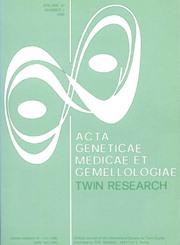Article contents
Demographic Parameters and Twinning: A Study in Catalonia, Spain
Published online by Cambridge University Press: 01 August 2014
Abstract
Core share and HTML view are not available for this content. However, as you have access to this content, a full PDF is available via the ‘Save PDF’ action button.
Twinning rates for the years 1975-79 in Catalonia (Spain) are presented. Crude rates are very low: 7.62 per 1,000 maternities, the DZTR and the MZTR being 3.74 and 3.88 respectively. Standardized rates remain very low. Sex ratio among twin couples is also very low (0.49 male vs 0.51 female births). A multiple linear stepwise regression on the twinning rates shows MZ rates to be influenced by birth order and father's age, and the DZ rates by mother's age and birth order.
- Type
- Research Article
- Information
- Acta geneticae medicae et gemellologiae: twin research , Volume 37 , Issue 2 , April 1988 , pp. 127 - 135
- Copyright
- Copyright © The International Society for Twin Studies 1988
References
REFERENCES
1.Bertanpetit, J, Marin, A, (1986): Nacimientos múltiples en España (1975–79). Trabajos de Antropologia 20:75–80.Google Scholar
2.Bulmer, MG (1959): The effect of parental age, parity and duration of marriage on the twinning rate. Ann Hum Genet 23:454–458.CrossRefGoogle ScholarPubMed
3.Bulmer, MG (1960): The twinning rate in Europe and Africa. Ann Hum Genet 24:121–125.Google Scholar
5.Doherty, JDH, Lancaster, PAL (1986): The secular trend of twinning in Australia, 1853–1982. Acta Genet Med Gemellol 35:61–76.Google ScholarPubMed
6.Fleiss, JL (1981): Statistical Methods for Rates and Proportions. New York: John Wiley and Sons.Google Scholar
7.Hemon, D, Berger, C, Lazar, P (1981): Some observations concerning the decline of dizygotic twinning rate in France between 1901 and 1968. Prog Clin Biol Res 69A:49–56.Google ScholarPubMed
9.James, WH (1972): Coital rates and dizygotic twinning. J Biosoc Sci 4:101–105.CrossRefGoogle ScholarPubMed
12.James, WH (1982): Dizygotic twinning, birth order, female psychology, and coital rates. Acta Genet Med Gemellol 31:119–126.Google ScholarPubMed
13.James, WH (1983): The sex ratio of Japanese twins. Hum Hered 33:109–111.CrossRefGoogle ScholarPubMed
14.Nylander, PPS (1981): The factors that influence twinning rates. Acta Genet Med Gemellol 30:189–202.Google ScholarPubMed
15.Parisi, P, Caperna, G (1981): The changing incidence of twinning: One century of Italian statistica. In Gedda, L, Parisi, P, Nance, WE (eds): Twin Research 3. Part A: Twin Biology and Multiple Pregnancy. New York: Alan R Liss pp 35–48.Google Scholar
16.Parisi, P, Caperna, G (1982): Twinning rates, fertility and industrialization: A secular study. In: Human Genetics. Part A: The Unfolding Genome. New York: Alan R Liss, pp 375–394.Google Scholar
17.Parisi, P, Gatti, M, Prinzi, G, Caperna, G (1983): Familial incidence of twinning. Nature 304:626–628.CrossRefGoogle ScholarPubMed
18.Ruder, A (1985): Paternal age and birth order effect on the secondary sex ratio. Am J Hum Genet 37:362–372.Google Scholar
19.Sala, E, Bertanpetit, J (1985): La proporción secundaria de sexos en Cataluña, 1975–1979. Actas del IV Congr Esp Antrop Biol, Barcelona; pp 131–140.Google Scholar
20.Sala, E, Marin, A, Bertranpetit, J (1986): Demographic parameters and sex ratio. Congress on Biodemography. Coimbra. (in press).Google Scholar
21.Scheinfeld, A (1976): Further notes on dizygotic twinning rate changes. Soc Biol 23:82–85.Google Scholar
22.Valls, A (1972): Sobre la repartición de la gemelaridad an España. Revista Española de Antropologia Americana 7:235–244.Google Scholar
- 4
- Cited by


